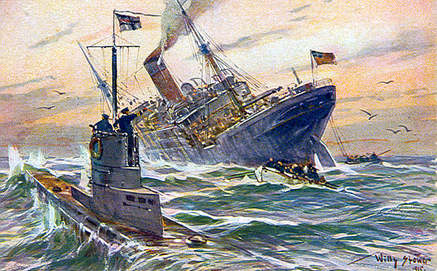
The causes of World War I have been the subject of intense study and debate for a hundred years. In general, historians tend to point to shifting alliances and arms races allowing regional conflicts to quickly escalate into full-scale wars.
The Congress of Vienna in 1815 had established a delicate balance of powers in Europe, but this balance was thrown off with the unification of Germany in 1871. Since then, alliances among the powers continually shifted as each country tried to shield itself against a possible attack from the others.
In 1914, the Archduke Franz Ferdinand, the son and heir of the Austrian emperor (still Franz Joseph from the Revolution of 1848, by the way) was assassinated in Serbia, one of the Austro-Hungarian Empire's territories. Austria prepared to move its army into Serbia. Russia, which had had a strong presence in the Balkans since defeating the Ottoman Empire several decades earlier, prepared its own army to fight the Austrians if necessary.

Unwilling to see a war between Austria-Hungary and Russia, which would put the Russian army on its doorstep, Germany warned Russia to stand down. Russia did not, and Germany declared war. Austria-Hungary, naturally, joined the war on Germany's side. The Ottoman Empire, eager to get back at Russia, also allied with Germany. Japan, looking to attack German holdings in China, declared war against Germany. Germany's allies became known as the Central Powers; the countries at war with Germany were known as the Allied Powers.
Germany's plan to win a war against Russia was to immediately attack France. If the Germans could defeat the French quickly, it would keep their western border secure and allow them to focus all their attention on Russia.
On the way to France, however, the German army invaded Belgium, which was allied with Great Britain, bringing every major European power into the war. The British and French managed to stop the Germans at the Battle of the Marne. Germany was now facing a two-front war. Both sides dug in and kept killing each other for the next four years, fighting over a battle-scarred no-man's-land with neither side making any gains.
The United States tried to remain mostly neutral, but kept sending supplies to Britain and France. This ticked off the Germans, who began using submarines to sink American supply ships, which ticked off the Americans. The German foreign secretary, Arthur Zimmermann, then reached out to Mexico, promising that if the Mexicans could declare war on the United States and keep the Americans busy enough to let Germany win in Europe, the German Empire would then be able to help Mexico take back Texas, New Mexico, and Arizona. The Mexicans thought about this for zero seconds and decided it would be impossible: Mexico was still in the middle of a civil war, and the United States not only had a more powerful army, but its Constitution had established an unusually well-armed civilian population. Zimmermann's telegram was then intercepted and decoded by British intelligence. The United States declared war on Germany and sent two million soldiers to Europe.
Things were looking very bad for Germany until 1917, when Tsar Nicholas II was overthrown during the Russian Revolution. This took Russia out of the war, allowing Germany to move almost all its troops over to France. A new German offensive was launched in 1918, but casualties were so heavy that the Germans could not sustain it. Pushed back by the French, British, and Americans, Kaiser Wilhelm abdicated and the Germans surrendered.
The consequences of World War I were massively important. It was by far the deadliest conflict in human history until this point. The fighting, coupled with the Ottoman Empire's genocide of Christian minorities, the Russian Revolution, and compounded by the 1918 Spanish Influenza pandemic, resulted in tens of millions of deaths. It shattered the commonly-believed myth that human progress was an inevitable force for good. The United States was established as a global power. Perhaps most importantly, the Treaty of Versailles placed the full blame of the war on Germany, devastating the German economy and creating widespread resentment that made political extremism begin to look attractive.